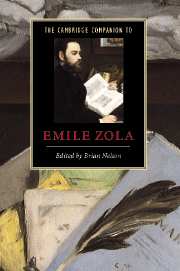Book contents
- Frontmatter
- 1 Zola and the nineteenth century
- 2 Family histories and family plots
- 3 Zola and the representation of society
- 4 Questions of sexuality and gender
- 5 Zola and contemporary painting
- 6 Zola and the art of fiction
- 7 Thérèse Raquin: animal passion and the brutality of reading
- 8 Nana: the world, the flesh and the devil
- 9 Germinal: the gathering storm
- 10 La Bête humaine: Zola and the poetics of the unconscious
- 11 Zola’s utopias
- 12 ‘J’accuse...!’: Zola and the Dreyfus Affair
- Further reading
- Index
4 - Questions of sexuality and gender
Published online by Cambridge University Press: 28 May 2007
- Frontmatter
- 1 Zola and the nineteenth century
- 2 Family histories and family plots
- 3 Zola and the representation of society
- 4 Questions of sexuality and gender
- 5 Zola and contemporary painting
- 6 Zola and the art of fiction
- 7 Thérèse Raquin: animal passion and the brutality of reading
- 8 Nana: the world, the flesh and the devil
- 9 Germinal: the gathering storm
- 10 La Bête humaine: Zola and the poetics of the unconscious
- 11 Zola’s utopias
- 12 ‘J’accuse...!’: Zola and the Dreyfus Affair
- Further reading
- Index
Summary
Questions of sexuality and gender occupy a pivotal place in Zola's understanding of the world, but it is only since the rise of feminism in the 1970s that Zola's surprisingly modern interest in these themes has attracted - and continues to attract - a great deal of critical attention. Indeed, when Zola's novels were first published, their often overtly sexual content was, along with his frank discussion of France's social and political problems, one of the principal reasons why they were at times greeted with indignation, even condemnation.
Zola's interest in questions of sexuality and gender can in part be explained by his commitment to close observation of even the most disturbing aspects of Second Empire society. One of the primary aims of Zola's naturalism was 'to see everything, know everything, say everything' ['tout voir, tout savoir, tout dire' (OC ix 351)], and it seemed that no subject was too scandalous for the novelist in his quest to document every aspect of society. Many of the details included in Zola's novels are drawn from his meticulous observation of reality and are fully documented in his extensive planning notes, but the range and manner of his observations were considered by many to represent a danger to the moral health of the nation. Although Zola was never successfully tried for obscenity in France, the translator and publisher of a number of English translations, Henry Vizetelly, was prosecuted twice under the Obscene Publications Act. Like the realist novelists of the previous generation, Zola wanted to depict in novelistic language the hitherto unspeakable truths of the human condition.
- Type
- Chapter
- Information
- The Cambridge Companion to Zola , pp. 53 - 66Publisher: Cambridge University PressPrint publication year: 2007

